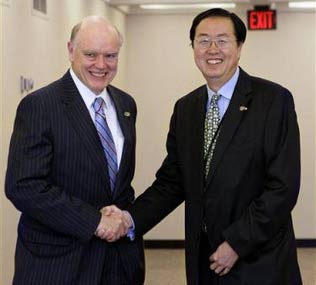|
US pressures China for more currency moves
(chinadaily.com.cn)
Updated: 2005-10-07 08:52
Growing high-level visits between China and the United States underline the importance of the bilateral relations, though officials from Washington often bring with them pressures and directives to the other.
On the eve of a trip to Beijing, U.S. Treasury Secretary John Snow said yesterday during a testimony to the Senate Finance Committee at the Capitol that he would ask China for more currency flexibility.
|

People's Bank of China Governor Zhou Xiaochuan and U.S. Treasury Secretary John Snow shake hands before they hold private talks at International Monetary Fund Headquarters in Washington, Saturday, Sept. 24, 2005.[AP]
|
"We will be meeting with Chinese authorities ... to make the case it is time to see greater (yuan) flexibility," Snow said. He and Federal Reserve chief Alan Greenspan are scheduled to visit Beijing from October 11-16 for the annual Sino-U.S. Joint Economic Conference.
U.S. manufacturers and their allies in Congress allege that China undervalues its currency, giving its producers an unfair trade advantage. ‘’Greater flexibility’’ is code for allowing the yuan to appreciate further versus the dollar. Washington assumes that market forces would push the Chinese currency higher due to China's large bilateral surplus with the United States.
In July, in the wake of strong pressure from the United States, China’s central bank allowed the yuan to appreciate 2.1%, and dropped its dollar peg and set up a managed float system against a basket of currencies, including the yen, euro and won.
"The commitment has been made, the initial step has been made, but we need to see more flexibility incorporated into the currency reflecting real demand and supply in the market," Snow said.
Not everyone sees Washington pressure on Beijing as a fair one. It has been reported the U.S. Treasury Department wanted the IMF (International Monetary Fund) to support its claims that China is a currency manipulator.
``We don't see evidence'' that China is violating the IMF rules against maintaining an artificially cheap currency, IMF managing director Rodrigo de Rato told the Washington Post earlier this week
De Rato's comments were in response to ones made days earlier by Tim Adams, U.S. Treasury undersecretary for international affairs. Adams accused the IMF of being ``asleep at the wheel'' on monitoring currencies.
Chinese central bankers have time and again since the July 21 yuan revaluation said it would be in everyone’s interests to adhere to “gradualism” in adopting further currency reform measures, because any more drastic moves would entail grave risks to China’s economy. A sudden breakdown of the Asia’s fasting growing economy will drag many down, they asserted.
Secretary Snow sidestepped questions on whether Beijing would be branded a currency manipulator in the Treasury's semiannual report due in early November.
Snow spoke during an exchange with Senator Charles Schumer, Democrat of New York, who is co-sponsoring a measure to impose tariffs of 27.5 percent on Chinese imports unless Beijing adopts a more flexible currency. Schumer and Lindsey Graham, Republican of South Carolina, agreed in June to delay their bill after Snow and Greenspan assured them China was about to change its policies.
The yuan traded at 8.09 to the dollar on Thursday, as compared with the 8.30 yuan vs a dollar prior to July 21
``The yuan has appreciated less in 10 weeks than China said it would allow in one day,'' Schumer said. ``To me that's greater evidence of currency manipulation. Clearly they aren't letting market forces take hold, they are afraid to let go.''
|